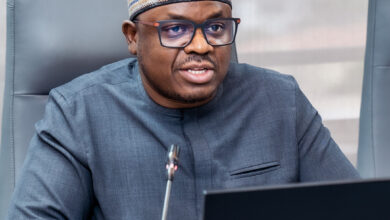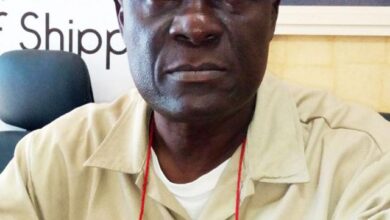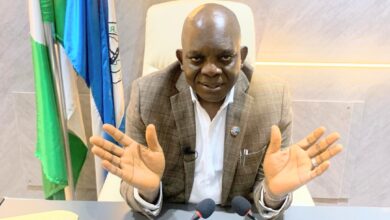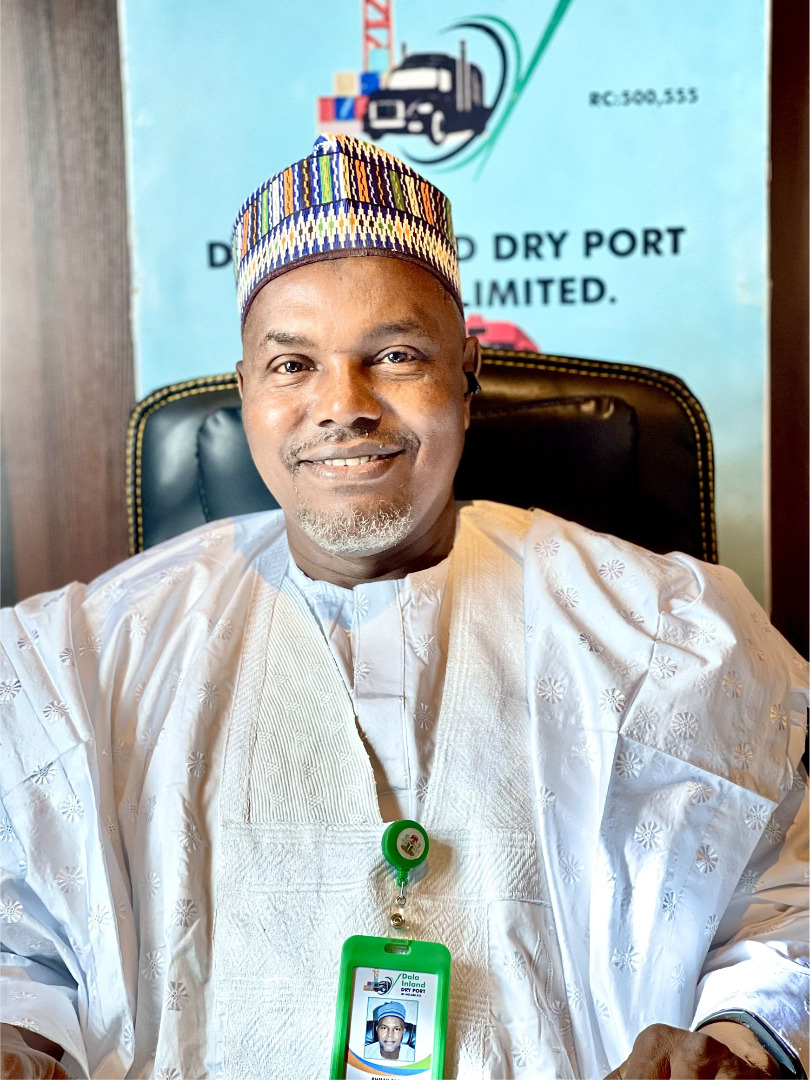
Ahead of the passage of a port economic regulator bill, Ahmad Rabiu, Managing Director of Dala Inland Dry Port in Kano has recommended an executive order as interim solution to addressing the challenge of through bill of lading from port of origin to port of destination.
Rabiu who doubles as Chairman of Association of Dry Port Operators of Nigeria told Ismail Aniemu that cargo movement by rail reduces cost of haulage by less than the cost of moving them by road while commending recent MoU between Nigeria Railway Corporation and Nigerian Shippers Council
Q:As chairman of Inland Dry Port Operators of Nigeria, there was this move by Nigeria Shippers Council to enlist the support of the Nigerian Railway cooperation for cargo movement by rail.How feasible do you see this and how do you think rail will improve your operations ?
Freight services by rail is key to the success of Inland transportation.Roads are used for shorter distances but for the longer distances across the world, the railway is always the best to use .It is feasible because it has already started.
We have commenced freighter services from Apapa port to Dala Inland Dry Port in Kano .We have also moved export many times from Dala Inland Dry Port to APM Terminals in Apapa.It will encourage use of narrow-guage rail line and the standard-guage will be completed in 2025.The Minister of Transportation has visited us several times and he has been coming to inspect the progress of the work.We believe that the commitment he has given is going to materialize.We will have the standard-guage coming to life by next year.Therefore , movement of our import and export shall mainly be by rail .
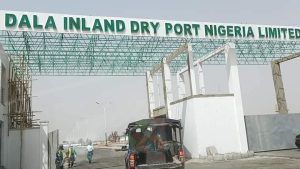
We will continue to use some road transportation because the rail can hardly be adequate as it is only one line .We are supposed to have about three to four lines running and many locomotives to all the locations.
From the MoU that the Nigerian Shippers Council has signed with the Nigerian Railway Cooperation, we are hopeful that we will both grow the number of locomotives and the number of flatbed for container carriage. In the same vein, there will be improved or increased private sector participation in their freighter services.It is what is used all over the world, and we are very confident with the commitment shown by the Nigerian Shippers Council Secretary through his visits and continuous sustained followup with the MD of the Nigerian Railway that has yielded the signed MoU.
We believe that will go a long way in improving the operating of various environments in Nigeria.That means improving the ease of doing business in Nigeria and improving the efficiency and competitiveness generally too
Q:Looking at cost in Naira and Kobo, how much on the average do you use to transport a container by road from Apapa , Lagos to Kano and how much are you expecting to use by rail?
By road, it is about N3 million and by rail, it is about N1 million.
Q:Looking at the number of Inland Dry Port in Nigeria , what is the prospect of growth of this type of business for areas that are not connected to the sea?
We are not connected to the sea and that is why we have Inland Dry Port.Dala Inland Dry Port is like Apapa and Tin Can ports.The only difference is that their cargo reaches them by sea and they have their export coming from the interland.For our case, we are having the cargo coming into port of arrival by land, road or rail.There is also the saying that we do receive cargo transportation from our neighbouring states and countries and that’s the major difference.The issue here is that we have very large volume of cargo that should be imported coming to Kano.
We also account to 79% of non-oil export out of the country from Kano.On that account, if we like to be fair to our neighbouring patrons, over 70% of non-oil export is coming from northern Nigeria and Northwest to be precise .There are six approved Inland ports already .One in every geoeconomic zone or geopolitical zone and on the account of the volume of the export cargo that we generate in Kano .
Q:What should we expect in terms of patronage for import because you dwelled very much on export.For imported cargo, arriving the ports of Lagos, Calabar ports and Port Harcourt port, how are you serving local industries in other parts of the countries who rely on dry ports?
By the virtue of our existence here, we are very close to local industries. We are saving them the cost of their traveling to the seaport cities.They don’t have to travel out of Kano to seaport cities of Port Harcourt, Calabar or Lagos.They don’t also have to have their cargoes stay there and accumulate demurrages at the port of first arrival.We have arranged for the arrival of any cargo meant for our location, to be transferred to us immediately.
When transferred to us, the cargo owner will be notified to go through all the processes and take delivery of the cargo without any delay that could lead to excessive demurrage charges.Today, we have decided that part of what makes our import logistics handling more costly is the fact that there are congestions at our seaports at first arrival, especially at Apapa and Tin can ports.That is what led to the creation of so many bonded terminals, some of which are not functioning anymore.They have closed down and auctioned their machines.
Once everyone bring their cargoes to the same location, and the process of releasing the cargo entails not only payment of import duty which could be done before the cargo arrives , there would be security agencies that must confirm if what is brought is allowed. There are standards that must be met.All those agencies have to inspect and make sure that the cargo, individually is confirmed to be good to go before it is allowed to be taken out.
You can imagine that a ship brings load that can be transferred with a thousand trucks and all the processes need to be completed and locations at the first arrival are seaports.It means there will be continuous congestion.The gridlock that we experienced would have continued unabated.With our decisions now, all cargoes for the interland are not processed in Lagos.Cargoes don’t suffer excessive cost of demurrage and rent charges.Above all, there is improvement in efficiency.What used to take two to three weeks now takes only two to three days.They now spend about a million on what they used to spend N3 million.All these are fundamental value addition from the coming into being of the Inland port. They are fully in operation.
Q:How are you managing the challenges of Through Bill of lading?
We have gone through all the processes .Firstly, we went through international competitive bidding as we were appointed as the preferred bidders.We were appointed to build and operate too . We have built the facility, we have equipped it, manned it and we are managing it.It has improved a great level of efficiency.There are some gaps because the Inland ports are new to Nigeria and it is common with our situation.We came into being, we signed an agreement, we were given a license by Nigerian Shippers Council and we also got declared by the Minister of Transportation as the port of origin and destination.We were commissioned by the President of Federal Republic to commence operations as ports of origin and destination and we went on to meet all the requirements of Nigerian Shipping Services and the Central Bank of Nigeria so that we could be able to really function as the port of origin and destination.After all these has happened, we still have some challenges regarding the transfer by the shipping lines seamlessly.
There is a big gap because of the contract of affreighment entered into with the the cargo owner and the lines for transfer of cargo that is imported from seaports abroad to our seaport in Nigeria.
I found out that the transfer of two of our facilities is another level of the project which we believe there is need for an executive order by the president to come in to cover it so that the shipping lines will work with that.
Addressing the interest of clearing and forwarding and Customs operation require that movement of any cargo to our dry port facility from the the port of arrival or destination should be allowed to happen seamlessly.
I believe the Executive Secretary of the Nigeria Shippers Council admitted that and he has seen the amount of investment we have done here. He is aware of the robust plan we have set and the strategies we have put in place to ensure effective competitiveness.We also exposed our limitations to him.The Ministerial commitee also came from the Ministry of Marine and Blue Economy.We have exposed these developments to them.
We believe most of them will come to terms with the reality of what must happen for us to continue to render the necessary support for the growth of the Nigerian economy and to improve the ease of doing business in the country.
There is a progress in the Act of the National Assembly already.An executive order is like a transitional arrangement to cover the gap because the economy can’t wait.The executive order will just provide the needed line for the servicing of the economy which has gone through the first and second reading of the Shippers Council bill of economic regulator.
I’m sure we will execute it before the end of the year.We need the executive order like yesterday.I’m sure that with the Commitment of the executive of the Nigerian Shippers Council and what we have seen from the Minister for Marine and Blue Economy, the processing of the Bill would be achieved without delay .
Q: We understood that the dry port in the north serve neighbouring countries of Niger and Chad.How did border closure affect you?
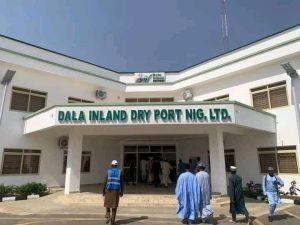
The border has been opened.We are in business.Niger is bordering Nigeria through eight states of the Federation.We are with Chad, Northern Cameroon and others that come in through the trans-saharan trade.
They have cargoes in their hub where they come to buy and sell .We are working together already .
Q:Let’s talk specifically about Dala Inland Dry Port.Can you give us an overview of the capacity of your port and the volume of cargo you have been able to handle since inception ?
The Dala Inland Dry Port is the pioneer in Shipping establishment of origin and destination through unsolicited offer to the Federal Government.
We started it and subsequently in 2002, the Nigerian Shippers Council spearheaded the the move for establishment of Inland Container Depots and they undertook a study for the survey of inland port in the country.
They recommended the six ICD projects.In 2003, under then President Olusegun Obasanjo and the Executive Council approved the establishment of the six and Dala Inland Dry Port was one of them.
It is 20,000 TEU holding capacity Inland port.It is on 200 hectres of land and 90 hectares which is the port area has been fully developed . Everything that is required from the starting area to our administrative block, warehouses, internal roads, have been properly set.
The volume we targeted for this year is 5000.We have not been able to attain it but we believe by the end of the year, we will go far beyond 15000.There is a season commencing in September and that season has promised us growth in capacity utilization.
What we suffered when we started beside the issue of Through Bill of Lading was also the issue of sorting the empty containers.Due to lack of empty containers. Our port users are now more sensitized on managing empty containers
Q: To what extent have you enjoyed support from the present Kano state Government?
We are enjoying support from the Kano State Government.They are ready to give us every support.They market us wherever they go.The Government operatives do advertise us in whatever events that takes place in Kano state and outside.
The government operatives also advertise Dala Inland Dry Port.When we invite them to events, they attend .They have sent some representatives here regarding revenue checks.We keep liasing with them to see what they can do .What we need at the moment are issues of support from the Federal Government






